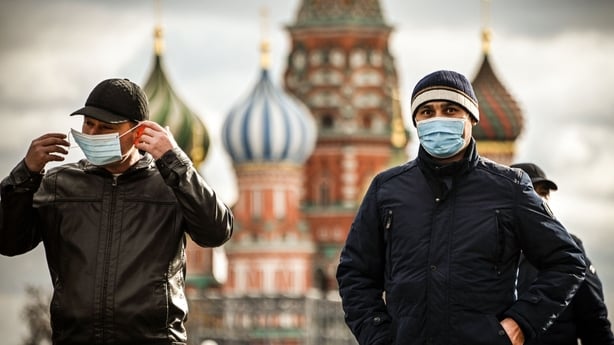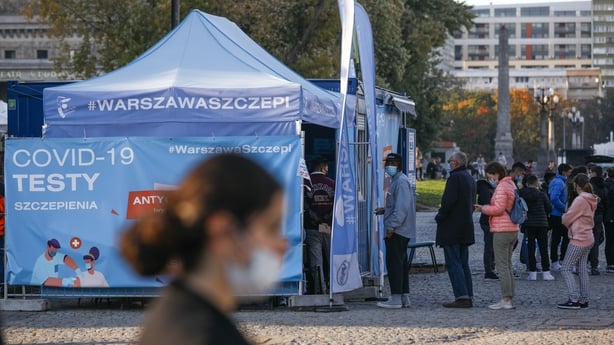Russia's President Vladimir Putin has ordered a nationwide week-long paid holiday to curb Covid-19 infections in Europe's worst affected country and urged Russians to show "responsibility" and get vaccinated.
Mr Putin approved a government plan to declare a non-working week across the country from 30 October as Russia registered a record 1,028 coronavirus deaths in a single day.
"The main aim is to protect the lives and health of our citizens," the 69-year-old said during a televised meeting.
The president said the severity of the outbreak in Russia was linked to the country's vaccination rates that are "unfortunately" low.
Infection rates have soared in recent weeks amid a stalled vaccination campaign, with only 35% of the country fully inoculated despite several widely available vaccines including Sputnik V.
Mr Putin said he was surprised by how many Russians were refusing the vaccine, even among his "close friends."
"It's strange. People with a good education, scientific degrees ... I just don't understand what is happening."
He has made numerous pleas for Russians to get Covid-19 jabs, and again called on people to get immunised.
"Please, show responsibility," he said.
Russia recorded over 34,000 new virus cases today and a total of 226,353 fatalities - the highest death toll on the European continent.
Authorities have been accused of vastly downplaying the scale of the pandemic, and Mr Putin told regional officials not to under-report the number of virus cases, calling it "dangerous."
He has introduced paid holidays during coronavirus peaks before, most recently in May.
The new non-working week will coincide with national school holidays.
Deputy Prime Minister Tatiana Golikova said the new restrictions were tough but necessary.
"Recently, we have been losing more than a thousand of our citizens a day. These are terrible figures," she said. She asked Russians not to travel between regions so as not to "worsen" the situation.
The Russian leader insists that the country has handled the pandemic better than most countries, but even top officials have recently voiced concern.
Pyotr Tolstoy, deputy chairman of parliament's lower house, said at the weekend that the authorities had "completely lost" an information campaign on coronavirus.
"There is no trust in people to go and vaccinate themselves, it is a fact," he said.

The holidays were announced a day after Moscow Mayor Sergei Sobyanin ordered the capital's first coronavirus restrictions since the summer.
He told unvaccinated over-60s in the city to work from home and extended mandatory vaccinations for service workers. Those restrictions take effect next Monday and are set to last until the end of February.
Mr Sobyanin also told employers to move 30% of their staff to home working.
Covid cases spike in Poland, Slovakia and Czech Republic
Poland's health minister has said the country is facing an explosion of Covid-19 cases that may require drastic action.
5,000 daily new infections have been recorded for the first time since May.
Central Europe has seen a surge in Covid-19 cases over recent days, fuelling fears that vaccination rates that are lower than in the west of the continent could fan a damaging fresh wave of infections.
"Over the last two days we have seen an explosion of the pandemic," Adam Niedzielski told a news conference.
"We have increases from week to week of 85% and over 100%."
Mr Niedzielski said daily cases could be "well above" 5,000 next week.
"We will want to observe if this trend continues for a few days, and maybe we will have to take drastic measures," he said, while adding that there was currently no discussion in government about imposing another lockdown.
Asked what he meant by "drastic" measures, Mr Niedzielski said it would involve stricter enforcement of existing rules about wearing masks and practicing social distancing.

Poland's vaccination programme has slowed significantly in recent months, and lower case numbers have led many people to feel they can disregard the few restrictions still in place.
Mr Niedzielski said both of these facts were contributing to the surge and he urged Poles to get a Covid-19 vaccine and follow the rules, for example by wearing masks in enclosed spaces.
The country of around 38 million people has reported 5,559 new coronavirus infections and 75 deaths.
While this is well below the peak of the third wave in spring when cases topped 35,000, pushing the health service to the brink, it is more than double the number reported a week ago.
Since the beginning of the pandemic Poland has reported 2,950,616 cases of Covid-19 and 76,254 deaths.
Meanwhile, Slovakia has reported 3,480 new Covid-19 cases, its highest daily tally since 9 March.
The Czech Republic reported 3,246 new cases, spiking above the 3,000 level for the first time since late April.

